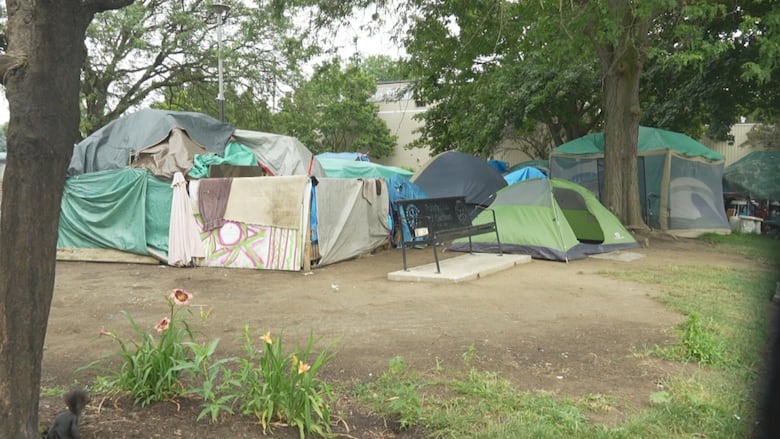Be angry at the system, not homeless people, advocate urges ahead of CK encampment meeting
Homeless people recently moved to a new municipal property

The executive director of an organization that works with encampment residents in Chatham-Kent says she understands people's anger about homelessness — but urges them to direct that anger where she says it really belongs: at higher levels of government that are not providing enough money for municipalities to solve the problem.
Renee Geniole of R.O.C.K. – Reach Out Chatham-Kent – says that's the message she'll be bringing to a special meeting of municipal council on Monday to discuss a new encampment on the Public Utilities Commission property.
"Nobody wants an encampment in their neighbourhood, but our anger is toward the systemic failings, not toward the people themselves that are affected by the systemic failings," she said.
"We don't have support systems big enough or hardy enough to actually help people to remove themselves from encampment situations."
Homeless people in Chatham-Kent previously camped next to the Thames River in Downtown Chatham.
But the municipality issued an eviction notice on July 2 because it needs to complete slope stabilization work on the river bank within the time frame required by its funders, said Kim Crew, the municipality's director of housing services, in an early July interview on CBC's Windsor Morning.
Significant public backlash
Around 40 people have since moved to the PUC lands, leading to complaints from residents and a plea from the Chatham-Kent Police Service for people to stop calling 911 about the issue.
More than 1,700 people have signed a petition expressing concerns about the encampment, and Mayor Darrin Canniff said Thursday he had 43 calls to return on the topic.
"I'm not sure that I've had an issue, that I've had that many people reaching out [about]," Canniff said.
"It's a significant issue in the community, and we owe it to the residents to have a public discussion about it."

Ontario courts have upheld the rights of unhoused people to camp on municipal lands if there are insufficient alternative shelter options.
Chatham-Kent already has an extensive encampment protocol outlining where camping can take place.
But Canniff posted on social media Friday that he intends to introduce a motion Monday that would amend that protocol to ban camping within 100 metres of a residential property.
Currently, the limit is 10 metres.
"When you look at London, for instance, [it's] 100 metres," he said Thursday.
"Look at Sarnia; they put a kilometre. So, you know, we're 10 metres. … Do we feel as council that that's fair that someone can set up an encampment 10 metres behind your residence?"
But Geniole said forcing encampment residents to move again risks traumatizing a group of vulnerable people who cooperated with the city by moving out of the riverside encampment because everyone from non-profits to police pitched in to make it as easy as possible.
Motion seeks to force people to move during the day
"It didn't become an issue until the community around had quite a large reaction to where they moved to," she said.
"Now … we're trying to mitigate what's been the stressor of this move."
Coun. Michael Bondy said he plans to put forward a motion Monday allowing people to continue to camp on public lands but forcing them to pack up and leave during the day.

"I don't believe it's fair to the community that an area with soccer fields and a trail system has been basically commandeered by a small group of people that have affected the lives and, frankly, the property values," he said.
"The businesses are nervous. Something's got to be done."
The motion, which would allow law enforcement to remove, seize or impound property, is a reaction to the concerns of citizens who have reached out to him, Bondy said.
"Open drug use, garbage, noise, inconvenience – people feel unsafe," he added.
"They feel that the green space has been effectively kind of occupied."
But Geniole questioned the validity of some of the complaints.
"Is there an actual danger?" she asked.
"Or is it rhetoric or is it fear mongering or is it, 'We're uncomfortable by … the poverty that we see?'"
It's completely reasonable to expect campers to be good neighbours by cleaning up garbage and refraining from hanging laundry on other people's fences, she said.
The encampment is only two weeks old, and R.O.C.K. has not yet finished setting up its peer work, but it can help campers live up to those expectations, she said.
Forcing campers to disperse during the day makes it much harder for organizations like hers to provide services to them, because first they have to find them.

Canniff said he hopes the meeting will strike a balance between the rights of homeless people and the rights of homeowners.
But Geniole said she's concerned the encampment residents will be further marginalized.
"When we start over-regulating to satisfy one portion of the population, you actually can make it harder for the other portion," she said.
"You're putting up more barriers."
With files from Heather Kitching and Bob Becken